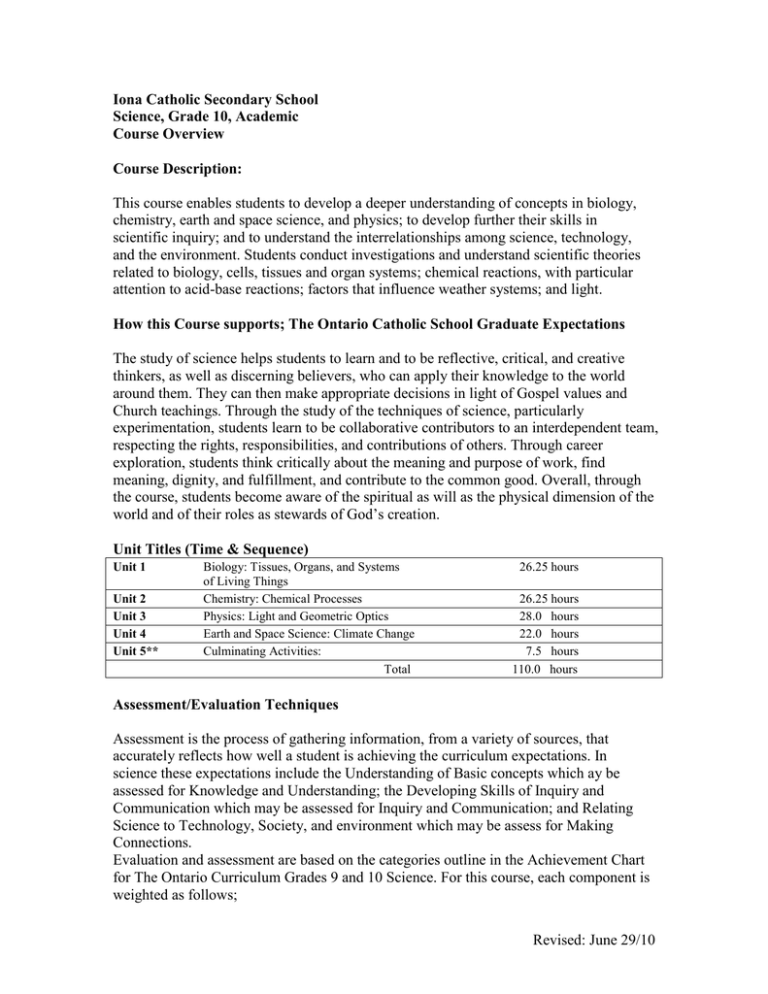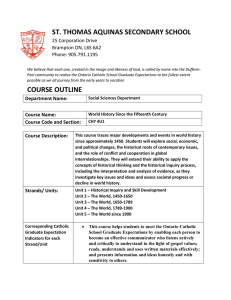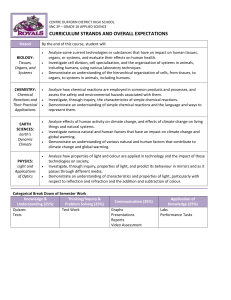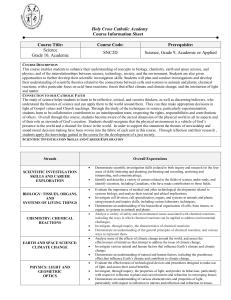This course enables students to develop a deeper understanding of... chemistry, earth and space science, and physics; to develop further... Iona Catholic Secondary School
advertisement

Iona Catholic Secondary School Science, Grade 10, Academic Course Overview Course Description: This course enables students to develop a deeper understanding of concepts in biology, chemistry, earth and space science, and physics; to develop further their skills in scientific inquiry; and to understand the interrelationships among science, technology, and the environment. Students conduct investigations and understand scientific theories related to biology, cells, tissues and organ systems; chemical reactions, with particular attention to acid-base reactions; factors that influence weather systems; and light. How this Course supports; The Ontario Catholic School Graduate Expectations The study of science helps students to learn and to be reflective, critical, and creative thinkers, as well as discerning believers, who can apply their knowledge to the world around them. They can then make appropriate decisions in light of Gospel values and Church teachings. Through the study of the techniques of science, particularly experimentation, students learn to be collaborative contributors to an interdependent team, respecting the rights, responsibilities, and contributions of others. Through career exploration, students think critically about the meaning and purpose of work, find meaning, dignity, and fulfillment, and contribute to the common good. Overall, through the course, students become aware of the spiritual as will as the physical dimension of the world and of their roles as stewards of God’s creation. Unit Titles (Time & Sequence) Unit 1 Unit 2 Unit 3 Unit 4 Unit 5** Biology: Tissues, Organs, and Systems of Living Things Chemistry: Chemical Processes Physics: Light and Geometric Optics Earth and Space Science: Climate Change Culminating Activities: Total 26.25 hours 26.25 hours 28.0 hours 22.0 hours 7.5 hours 110.0 hours Assessment/Evaluation Techniques Assessment is the process of gathering information, from a variety of sources, that accurately reflects how well a student is achieving the curriculum expectations. In science these expectations include the Understanding of Basic concepts which ay be assessed for Knowledge and Understanding; the Developing Skills of Inquiry and Communication which may be assessed for Inquiry and Communication; and Relating Science to Technology, Society, and environment which may be assess for Making Connections. Evaluation and assessment are based on the categories outline in the Achievement Chart for The Ontario Curriculum Grades 9 and 10 Science. For this course, each component is weighted as follows; Revised: June 29/10 Evaluation (Total 100 %) Term work (70 %) Knowledge / Understanding Inquiry Application Communication Final (30 %) CPT Exam Total 17.5 % 24.5 % 17.5 % 10.5 % 10.0 % 20.0 % 100.0 % The above list constitutes a guideline within which student work will be assessed and evaluated. In all other aspects, the School’s Policy on Evaluation and Assessment will be followed. Please refer to the Student Handbook for further details. Assessments Strategies Personal Communication - Essays - Journals - lab reports - self-assessments - student-teacher conferences Paper and Pencil Tests - quizzes - unit tests - final exams Observation - formal/informal by teacher Performance Assessment - research project/essay - student-performed experiments - portfolio of possible newspaper articles - newspaper components Assessment Tools - checklists - marking schemes - rubrics - anecdotal comments with suggestions for improvements Revised: June 29/10 Resources: Nelson, Science Perspective 10 The Parent-Home Connection Nelson Science 10 – Perspectives - recognizes the parent as an integral part of the learning process. The Student text has been designed to provide parents with an easy-toread overview of what their child will know and be able to do at the end of each unit of study. The Unit Summary and the Unit Review at the end of each unit provide parents with a tool to assist their child to ensure concepts are understood, skills are developed, and connections can be made between the concepts for science, technology, society, and the environment. The Nelson Science Website features an area for parents, that provides suggestions for assisting their child’s learning and engaging them in discussions about concepts being learned. Definitions Assessment involves gathering information about student performance using a variety of tools and techniques. Teachers assess students by observing them and listening to them as they complete a variety of tasks. Grant Wiggins encourages educators to regard assessment as an ongoing process of providing feedback to students in order to coach them to ward successful performance. Assessment also provides information to the teacher about the next steps of instruction. Evaluation involves making a judgment about the quality of student achievement based on the evidence of student learning. It requires comparing student performance to a known standard. Evaluation is necessary because students, and their parents, need to know where students stand in relation to provincial standards. When teachers put a grade on a test, they are informing students and parents about the degree to which the students have met the provincial standard on this particular evaluation task. Grading is a symbolic representation of the judgment made in evaluation. Diagnostic assessment provides information to help guide instruction, but does not count toward a student’s report card grade. Formative assessment will reflect a student’s steadily improving performance. As such, we can expect that a student’s performance will improve as a unit progresses. Summative assessment occurs towards the end of each unit and should reflect the student’s best performance. It should comprise the greater part of a student’s report card grade. Revised: June 29/10 Unit Organization Unit 1: Biology: Tissues, Organs, and Systems of Living Things In this unit the student will learn about cells, tissues, and organs and how they work together in systems in plants and in animals. You will also learn about technologies designed to diagnose, study, treat, and cure diseases affecting body systems. Student will also use appropriate terminology related to cells, tissues, organs, and systems of living things. Students will have an opportunity to examine cells under the microscope to identify the various stages of mitosis, specialization of cells, and cancer cells in plant and animal cells. Overall Expectations: - evaluate the importance o medical and other technological developments related to systems biology, and analyse their societal and ethical implications; - investigate cell division, cell specialization, organs, and systems in animals and plants, using research and inquiry skills, including various laboratory techniques; - demonstrate an understanding of the hierarchical organization of cells, from tissues, to organs, to systems in animals and plants. Unit 2: Chemistry: Chemical Reactions and their Practical Applications In this unit students demonstrate an understanding of chemical reactions and the factors affecting their rates. Students design and conduct investigations of chemical reactions. They apply their knowledge of chemical reactions to the development of consumer products and industrial processes. As informed Catholic citizens and responsible stewards, students use their knowledge of chemistry in addressing home safety issues as well as the broad arena of pressing environmental concerns. Ontario Catholic School Graduate Expectations: Overall Expectations: - analyse a variety of safety and environmental issues associated with chemical reactions, including the ways in which chemical reactions can be applied to address environmental challenges; - investigate, through inquiry, the characteristics of chemical reactions; - demonstrate an understanding of the general principles of chemical reactions, and various ways to represent them. Revised: June 29/10 Unit 3: Physics: Light and Geometric Optics Students evaluate the contributions of optical devices to such areas as entertainment, communications, and health and other technologies. Students study the properties of light and the principles underlying the transmission of light through medium and from one medium to another. They investigate the properties of light through experimentation (reflection using straight, concave and convex mirrors), and illustrate and predict the behaviour of light through the use of ray diagrams and algebraic equations. Ontario Catholic School Graduate Expectations: Overall Expectations: - evaluate the effectiveness of technological devices and procedures designed to make use of light, and assess their social benefits; - investigate, through inquiry, the properties of light, and predict its behaviour, particularly with respect to reflection in plane and curved mirrors and refraction in converging lenses; - demonstrate and understanding of various characteristics and properties of light, particularly with respect to reflection in mirrors and reflection and refraction in lenses. Unit 4: Earth and Space Science: Climate Change In this unit students will analyse current and/or potential effects, both positive and negative, of climate change on human activity and natural systems. The students will assess, on the basis of research, the effectiveness of some current individual, regional, national, or international initiatives that address the issue of climate change. Also students will use appropriate terminology related to climate change, and analyse different sources of scientific data for evidence of natural climate change and climate change influenced by human activity. The students will get an understanding of the principal components of Earth’s climate systems and how the systems work. They will also be able to describe and explain heat transfer in the hydrosphere and atmosphere and its effects on air and water currents and the natural greenhouse effect. Ontario Catholic School Graduate Expectations: CGE 2a,b,c,d,e; 3c; 4a,f; 5a,e; 7b Overall Expectations: - analyse some of the effects o climate change around the world, and assess the effectiveness of initiatives that attempt to address the issue of climate change; - investigate various natural and human factors that influence Earth’s climate and climate change; - demonstrate an understanding o natural and human factors, including the greenhouse effect, that influence Earth’s climate and contribute to climate change. Revised: June 29/10 Unit 5: Culminating Activity: Ontario Catholic School Graduate Expectations: Revised: June 29/10


